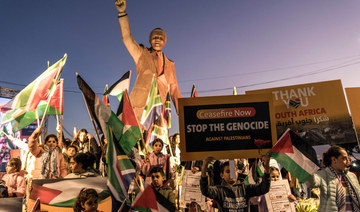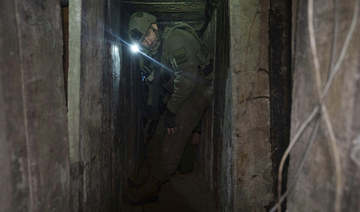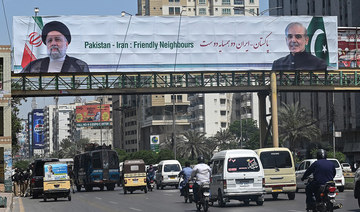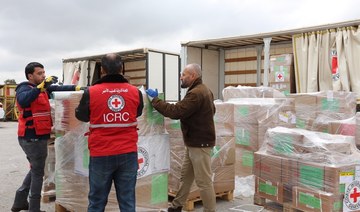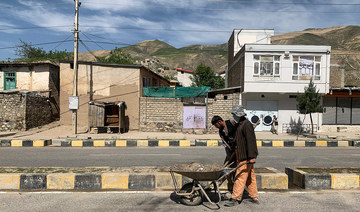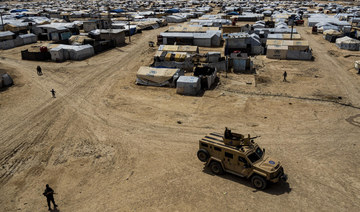CAPE TOWN: Barely two weeks after he was released from prison in 1990, Nelson Mandela flew to Zambia to meet with African leaders who had supported his fight against South Africa’s apartheid system of forced racial segregation.
One figure stood out among the men in dark suits eagerly waiting to greet Mandela on the airport tarmac: Palestinian leader Yasser Arafat, wearing his black and white checkered keffiyeh headdress, had traveled to see the newly freed Mandela.
He grabbed Mandela in a bear hug and kissed him on each cheek. Mandela smiled broadly. It was confirmation of the solidarity between two men who considered their peoples’ struggles for freedom to be the same.
South Africans continue to support the Palestinian cause, and the country has taken the rare step of bringing a genocide case against Israel at the International Court of Justice because of its war in Gaza.
South Africa is not a diplomatic heavyweight and is geographically far from the conflict. But its ruling African National Congress, which Mandela led from an anti-apartheid liberation movement to a political party in government, has retained its strong pro-Palestinian stance even after Mandela died in 2013.
“We have stood with the Palestinians and we will continue to stand with our Palestinian brothers and sisters,” Mandela’s grandson, Mandla Mandela, said at a pro-Palestinian rally in Cape Town in October, days after the Hamas attack in southern Israel spurred the war on Gaza. Mandla Mandela, an ANC lawmaker, wore a black and white Palestinian keffiyeh around his neck as he spoke to a large crowd.
Nelson Mandela regularly raised the plight of the Palestinians. Three years after apartheid and white minority rule was dismantled in South Africa and Mandela was elected president in historic all-race elections in 1994, he thanked the international community for its help. He added: “But we know too well that our freedom is incomplete without the freedom of the Palestinians.”
Mandela and South African leaders after him compared the restrictions Israel placed on Palestinians in Gaza and the West Bank with the treatment of Black South Africans during apartheid, framing the two issues as fundamentally about people oppressed in their homeland. Israel provided weapons systems to South Africa’s apartheid government and maintained secret military ties with it up until the mid-1980s, even after publicly denouncing apartheid.
The ANC has consistently criticized Israel as an “apartheid state,” even before the current war. International rights groups have also accused Israel of the crime of apartheid against Palestinians and that “resonates strongly with South Africa,” said Thamsanqa Malusi, a South African human rights lawyer.
Malusi said many in the South African government experienced the oppression of apartheid and that could help explain its decision to lodge the case against Israel at the UN’s top court.
While Mandela, the Nobel Peace Prize-winning statesman, also reached out to Israel in an attempt to foster a peaceful solution, anti-Israeli rhetoric in South Africa has strengthened over the years, sometimes seeping into everyday life. For example, the ANC’s youth wing pressured South African grocery store chains to drop Israeli products and threatened to forcibly shut them down if they didn’t.
Israel’s assault on Gaza sparked renewed solidarity with the Palestinian cause in South Africa. Thousands have marched in support of Gaza in Cape Town and Johannesburg, and buildings in the Cape Town neighborhood of Bo Kaap were adorned with pro-Palestine graffiti in the weeks after the war broke out.
South African President Cyril Ramaphosa — the current leader of the ANC — has criticized both Israel and Hamas for what he calls atrocities committed by both sides in the conflict. But he also appeared in public wearing a keffiyeh and holding a Palestine flag, even as he offered condolences to Israel over the Oct. 7 Hamas attacks, leaving little doubt where South Africa’s sympathies lie.
ANC officials, including Mandla Mandela, hosted three Hamas officials in South Africa last month, including the group’s top representative in Iran. They attended a ceremony marking the 10th anniversary of Nelson Mandela’s death before a statue of the former South African President at the seat of government in a nod to his historic connection with the Palestinian cause.
On Wednesday, the eve of the court proceedings, Palestinians in the West Bank city of Ramallah crowded around another statue of Mandela, waving Palestinian and South African flags and holding signs that read: “Thank You South Africa.”
The Hamas visit to South Africa was not welcomed by all, though.
South Africa’s main opposition party has said it considers Hamas a terrorist organization, as do the United States and European Union, and support for Palestinians in South Africa has complicated racial connotations. Black and mixed-race South Africans, brutally oppressed under apartheid, have been at the forefront of the support for Palestinians. Support is not as pronounced among South Africa’s white minority.
South Africa’s ANC-led government says it is taking a morale stance in its genocide case against Israel, first seeking an order for Israel to stop the assaults in Gaza that have killed more than 23,300 Palestinians, two-thirds of them women and children, according to the Gaza Health Ministry.
But the case has given rise to accusations of hypocrisy: The ANC has itself ignored international court orders.
The ANC government refused to arrest then-Sudanese President Omar Al-Bashir when he visited South Africa in 2015 while the subject of a warrant on allegations of genocide by the separate International Criminal Court. South Africa has also retained strong ties with Russia and President Vladimir Putin since the invasion of Ukraine, overlooking an ICC indictment against Putin for alleged war crimes in relation to the abduction of children from Ukraine.
Nelson Mandela’s support for Palestinians endures with South Africa’s genocide case against Israel
https://arab.news/nmhxc
Nelson Mandela’s support for Palestinians endures with South Africa’s genocide case against Israel
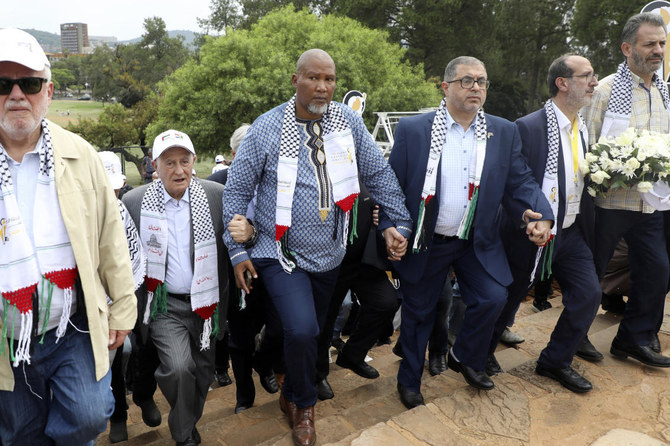
- South Africa’s long-held support for the Palestinian people can be traced back to the time of Nelson Mandela and Yasser Arafat
UN chief calls for ‘immediate’ Gaza ceasefire, hostage release

- UN chief: ‘The war in Gaza is causing horrific human suffering, devastating lives, tearing families apart and rendering huge numbers of people homeless, hungry and traumatized’
KUWAIT CITY: UN Secretary-General Antonio Guterres on Sunday urged an immediate halt to the Israel-Hamas war in Gaza, the return of hostages and a “surge” in humanitarian aid to the besieged Palestinian territory.
“I repeat my call, the world’s call for an immediate humanitarian ceasefire, the unconditional release of all hostages and an immediate surge in humanitarian aid,” Guterres said in a video address to an international donors’ conference in Kuwait.
“But a ceasefire will only be the start. It will be a long road back from the devastation and trauma of this war,” he added.
Israeli strikes on Gaza continued on Sunday after it expanded an evacuation order for Rafah despite international outcry over its military incursion into eastern areas of the city, effectively shutting a key aid crossing.
“The war in Gaza is causing horrific human suffering, devastating lives, tearing families apart and rendering huge numbers of people homeless, hungry and traumatized,” Guterres said.
His remarks were played at the opening of the conference in Kuwait organized by the International Islamic Charitable Organization (IICO) and the UN’s humanitarian coordination organization OCHA.
On Friday, in Nairobi, the UN head warned Gaza faced an “epic humanitarian disaster” if Israel launched a full-scale ground operation in Rafah.
Gaza’s bloodiest-ever war began following Hamas’s unprecedented October 7 attack on Israel that resulted in the deaths of more than 1,170 people, mostly civilians, according to an AFP tally of Israeli official figures.
Vowing to destroy Hamas, Israel launched a retaliatory offensive that has killed more than 34,971 people in Gaza, mostly women and children, according to the Hamas-run territory’s health ministry.
Iran conservatives tighten grip in parliament vote

- Elected members are to choose a speaker for the 290-seat parliament when they begin their work on May 27
- Conservatives won the majority of the 45 remaining seats up for grabs in the vote held in 15 of 31 provinces: local media
TEHRAN: Iran’s conservatives and ultra-conservatives clinched more seats in a partial rerun of the country’s parliamentary elections, official results showed Saturday, tightening their hold on the chamber.
Voters had been called to cast ballots again on Friday in regions where candidates failed to gain enough votes in the March 1 election, which saw the lowest turnout — 41 percent — since the 1979 Islamic Revolution.
Candidates categorized as conservative or ultra-conservative on pre-election lists won the majority of the 45 remaining seats up for grabs in the vote held in 15 of Iran’s 31 provinces, according to local media.
For the first time in the country, voting on Friday was a completely electronic process at eight of the 22 constituencies in Tehran and the cities of Tabriz in the northwest and Shiraz in the south, state TV said.
“Usually, the participation in the second round is less than the first round,” Interior Minister Ahmad Vahidi told reporters in Tehran, without specifying what the turnout was in the latest round.
“Contrary to some predictions, all the candidates had a relatively acceptable and good number of votes,” he added.
Elected members are to choose a speaker for the 290-seat parliament when they begin their work on May 27.
In March, 25 million Iranians took part in the election out of 61 million eligible voters.
The main coalition of reform parties, the Reform Front, had said ahead of the first round that it would not participate in “meaningless, non-competitive and ineffective elections.”
The vote was the first since nationwide protests broke out following the September 2022 death in custody of Mahsa Amini, a 22-year-old Iranian Kurd, arrested for allegedly breaching the Islamic republic’s strict dress code for women.
In the 2016 parliamentary elections, first-round turnout was above 61 percent, before falling to 42.57 percent in 2020 when elections took place during the Covid pandemic.
UN reports fighting in Sudan’s Darfur involving ‘heavy weaponry’

- The United States last month warned of a looming rebel military offensive on the city, a humanitarian hub that appears to be at the center of a newly opening front in the country’s civil war
PORT SUDAN: A major city in Sudan’s western region of Darfur has been rocked by fighting involving “heavy weaponry,” a senior UN official said Saturday.
Violence erupted in populated areas of El-Fasher, putting about 800,000 people at risk, Clementine Nkweta-Salami, the UN’s humanitarian coordinator for Sudan, said in a statement.
Wounded civilians were being rushed to hospital and civilians were trying to flee the fighting, she added.
“I am gravely concerned by the eruption of clashes in (El-Fasher) despite repeated calls to parties to the conflict to refrain from attacking the city,” said Nkweta-Salami.
“I am equally disturbed by reports of the use of heavy weaponry and attacks in highly populated areas in the city center and the outskirts of (El-Fasher), resulting in multiple casualties,” she added.
For more than a year, Sudan has suffered a war between the army, headed by the country’s de facto leader Abdel Fattah Al-Burhan, and the paramilitary Rapid Support Forces (RSF), commanded by his former deputy Mohamed Hamdan Dagalo.
The war has killed tens of thousands of people and forced more than 8.5 million to flee their homes in what the United Nations has called the “largest displacement crisis in the world.”
The RSF has seized four out of five state capitals in Darfur, a region about the size of France and home to around one quarter of Sudan’s 48 million people.
El-Fasher is the last major city in Darfur that is not under paramilitary control and the United States warned last month of a looming offensive on the city.
UN chief Antonio Guterres said Saturday he was “very concerned about the ongoing war in Sudan.”
“We need an urgent ceasefire and a coordinated international effort to deliver a political process that can get the country back on track,” he said in a post on social media site X.
Tunisian police arrest prominent lawyer critical of president

- Dozens of lawyers took to the streets in protest on Saturday night, carrying banners reading “Our profession will not kneel” and “We will continue the struggle” Saied came to power in free elections in 2019
TUNIS: Tunisian police stormed the building of the Deanship of Lawyers on Saturday and arrested Sonia Dahmani, a lawyer known for her fierce criticism of President Kais Saied, and then arrested two journalists who witnessed the confrontation, a journalists’ syndicate said.
Two IFM radio journalists, Mourad Zghidi and Borhen Bsaiss, were arrested, an official in the country’s main journalists’ syndicate told Reuters. The incident was the latest in a series of arrests and investigations targeting activists, journalists and civil society groups critical of Saied and the government. The move reinforces opponents’ fears of an increasingly authoritarian government ahead of presidential elections expected later this year.
Dahmani was arrested after she said on a television program this week that Tunisia is a country where life is not pleasant. She was commenting on a speech by Saied, who said there was a conspiracy to push thousands of undocumented migrants from Sub-Saharan countries to stay in Tunisia. Dahmani was called before a judge on Wednesday on suspicion of spreading rumors and attacking public security following her comments, but she asked for postponement of the investigation.
The judge rejected her request. Dozens of lawyers took to the streets in protest on Saturday night, carrying banners reading “Our profession will not kneel” and “We will continue the struggle” Saied came to power in free elections in 2019. Two years later he seized additional powers when he shut down the elected parliament and moved to rule by decree before assuming authority over the judiciary.
Since Tunisia’s 2011 revolution, the country has won more press freedoms and is considered one of the more open media environments in the Arab world. Politicians, journalists and unions, however, say that freedom of the press faces a serious threat under the rule of Saied. The president has rejected the accusations and said he will not become a dictator.
Syrian Kurdish force hands over 2 Daesh members suspected in 2014 mass killing of Iraqi troops

- Iraq has, over the past several years, put on trial and later executed dozens of Daesh members over their involvement in the Speicher massacre
BEIRUT: Syria’s US-backed Kurdish-led force has handed over to Baghdad two Daesh militants suspected of involvement in mass killings of Iraqi soldiers in 2014, a war monitor said.
The report by the Syrian Observatory for Human Rights came a day after the Iraqi National Intelligence Service said it had brought back to the country three Daesh members from outside Iraq. The intelligence service did not provide more details.
Daesh captured an estimated 1,700 Iraqi soldiers after seizing Saddam Hussein‘s hometown of Tikrit in 2014. The soldiers were trying to flee from nearby Camp Speicher, a former US base.
BACKGROUND
Daesh captured an estimated 1,700 Iraqi soldiers after seizing Saddam Hussein‘s hometown of Tikrit in 2014.
Shortly after taking Tikrit, Daesh posted graphic images of Daesh militants shooting and killing the soldiers.
Farhad Shami, a spokesman for the Kurdish-led Syrian Democratic Forces, said the US-backed force handed over two Daesh members to Iraq.
It was not immediately clear where Iraqi authorities brought the third suspect from.
The 2014 killings, known as the Speicher massacre, sparked outrage across Iraq and partially fueled the mobilization of militias in the fight against Daesh.
Iraq has, over the past several years, put on trial and later executed dozens of Daesh members over their involvement in the Speicher massacre.
The Observatory said the two Daesh members were among 20 captured recently in a joint operation with the US-led coalition in the northern Syrian city of Raqqa, once the capital of Daesh’s self-declared caliphate.
Despite their defeat in Iraq in 2017 and in Syria in March 2019, the extremist sleeper cells are still active and have been carrying out deadly attacks against SDF and Syrian government forces.
Shami said a car rigged with explosives and driven by a suicide attacker tried on Friday night to storm a military checkpoint for the Deir El-Zour Military Council. This Arab majority faction is part of the SDF in the eastern Syrian village of Shuheil.
Shami said that when the guards tried to stop the car, the attacker blew himself up, killing three US-backed fighters.
No one immediately claimed responsibility for the attack, but it was similar to previous explosions carried out by IS militants.
The SDF is holding over 10,000 captured Daesh fighters in around two dozen detention facilities, including 2,000 foreigners whose home countries have refused to repatriate them.



